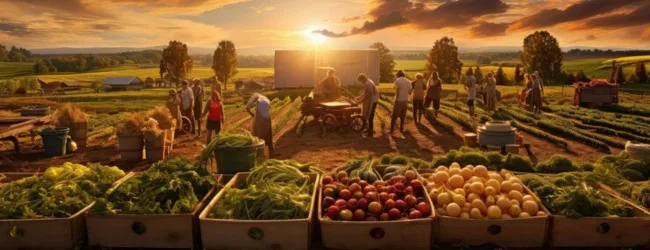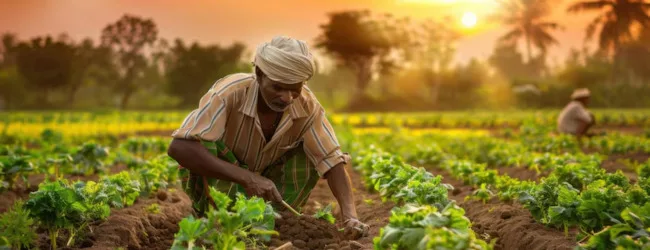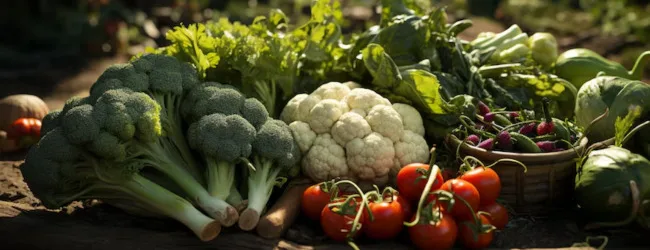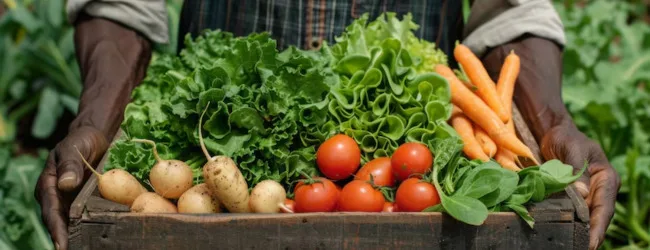Table of contents
- Why Vegetable Farming?
- Where is Vegetable Farming Done on a Large Scale in India?
- Classification of Vegetables for Farming
- How to Start Vegetable Farming in India
- Profits in Vegetable Farming
- Effective Techniques for Better Yield
- Additional Revenue Sources
- Government Support & Schemes
- Challenges in Vegetable Farming
- Conclusion
- Frequently Asked Questions (FAQs)
Vegetable farming in India is one of the most profitable and sustainable agricultural practices. With rising demand for fresh produce and a shift towards organic living, even small farmers can earn high returns with the right knowledge and approach.
Why Vegetable Farming?

Key Points:
- India ranks second in global vegetable production after China.
- Demand is constant—vegetables are daily essentials.
- Requires less land and time compared to grain crops.
- Offers scope for intercropping, organic farming, and export.
Where is Vegetable Farming Done on a Large Scale in India?
Major states:
- West Bengal – Top producer (potatoes, tomatoes).
- Uttar Pradesh – Onion, cauliflower, brinjal.
- Maharashtra – Tomato, chilli, okra.
- Tamil Nadu & Karnataka – Drumstick, beans, gourds.
Classification of Vegetables for Farming
| Category | Examples |
|---|---|
| Climber Vegetables | Bottle gourd, Bitter gourd, Cucumber, Beans |
| Underground Vegetables | Potato, Carrot, Radish, Onion, Garlic |
| Leafy Vegetables | Spinach, Fenugreek, Coriander, Amaranthus |
| Tree Vegetables | Drumstick (Moringa), Curry leaves |
| Fruiting Vegetables | Tomato, Brinjal, Capsicum, Chilli |
💡 Pro Tip: If you want to start a Business but have too many doubts, connect with a Business expert from Boss Wallah for guidance – Check Out
How to Start Vegetable Farming in India

Step-by-Step Guide:
- Choose the Right Land:
- Prefer loamy or sandy-loam soil.
- Ensure adequate water supply.
- Select Suitable Crops:
- Based on climate, soil type, and market demand.
- Refer to the local Krishi Vigyan Kendra (KVK) for expert advice.
- Prepare the Land:
- Ploughing, harrowing and levelling for uniform soil.
- Add organic manure or compost.
- Get Quality Seeds:
- Buy from certified nurseries or agri-dealers.
- Prefer disease-resistant and high-yielding varieties.
- Irrigation Planning:
- Use drip irrigation or sprinklers for water efficiency.
- Use Effective Farming Techniques:
- Crop rotation to maintain soil health.
- Mulching to retain soil moisture.
- Integrated Pest Management (IPM) to reduce chemical usage.
- Harvesting & Post-Harvest Care:
- Timely harvest to avoid losses.
- Clean, grade and pack before sending to market.
- Sell Smartly:
- Local markets, mandis, online platforms, and direct-to-home services.
- Explore contract farming with companies.
Profits in Vegetable Farming
Average Profit Margin: 30% to 60% (depending on crop and scale)
Sample Table – Cost & Profit (1 Acre Vegetable Farming Example)
| Crop | Cost (INR) | Yield (Tonnes) | Selling Price/Tonne (INR) | Total Revenue | Net Profit |
| Tomato | 50,000 | 10 | 8,000 | 80,000 | 30,000 |
| Bottle Gourd | 40,000 | 7 | 10,000 | 70,000 | 30,000 |
| Spinach | 35,000 | 5 | 12,000 | 60,000 | 25,000 |
ALSO READ | Mulching Farming Techniques: Choosing the Right Mulch for Your Crops
Effective Techniques for Better Yield

- Use of organic compost and bio-fertilisers.
- Greenhouse farming for off-season vegetables.
- Hydroponics & Vertical Farming – ideal for urban/agri-tech setups.
- Soil testing every season.
- Smart sensors for irrigation & fertilisation.
Additional Revenue Sources
- By-products: Vegetable seeds, plant waste and cattle feed.
- Value addition: Pickles, purees, dried vegetables.
- Agri-tourism: Urban dwellers pay to visit & harvest.
Government Support & Schemes
- PM-KISAN Yojana – Direct cash support.
- NABARD – Subsidised loans for irrigation, greenhouse.
- eNAM (National Agriculture Market) – Digital selling.
- Agri-Clinic & Agri-Business Centres (ACABC).
For more, visit: Ministry of Agriculture
ALSO READ | Contour Farming: Meaning, Practices, Advantages & Challenges
Challenges in Vegetable Farming

- Perishable nature – needs fast logistics.
- Market fluctuation.
- Pest attacks and diseases.
Solutions:
- Use cold storage, partner with FPOs.
- Join farmer co-operatives.
Need Expert Guidance?
Starting a business can be challenging, but you don’t have to do it alone! At Boss Wallah, our 2,000+ business experts are ready to provide valuable insights and guidance. Whether you need help with marketing, finance, sourcing, or any other area of any business, our business experts are here to help you succeed
Confused about Which Business to Start?
Want to start your own business but unsure which one to choose? Explore Boss Wallah, where you’ll find 500+ courses by successful business owners, featuring practical, step-by-step guides on starting and growing various businesses.
Find your perfect business idea today
Conclusion
Vegetable farming is not just about growing food—it’s a path to financial freedom and sustainability. With proper planning, modern methods, and a business mindset, even a small landholder can earn significant profits.
Frequently Asked Questions (FAQs)
1. Which vegetable gives the highest profit in India?
- Tomato, spinach, and bitter gourd are high-profit vegetables.
2. How much land is required for profitable vegetable farming?
- Even 1 acre can be profitable with high-yield crops.
3. Can I start vegetable farming without experience?
- Yes. Training from KVKs and YouTube tutorials helps a lot.
4. What’s the average profit from 1 acre of vegetable farming?
- INR 30,000 to INR 80,000 depending on the crop.
5. What are the common diseases in vegetables?
- Blight, mildew, root rot. Use IPM and certified seeds.
6. Where can I sell my vegetables?
- Local markets, hotels, online apps, and direct-to-home.
7. What is contract farming in vegetables?
- Agreements with companies to buy your produce at fixed prices.
8. How to protect vegetables from pests naturally?
- Use neem oil spray, garlic-chilli extract, or pheromone traps.
9. Is organic vegetable farming more profitable?
- Yes, but takes time to build trust and brand.
10. Do I need a license to start vegetable farming?
- No, for small-scale, but FSSAI registration is needed for processed items.


